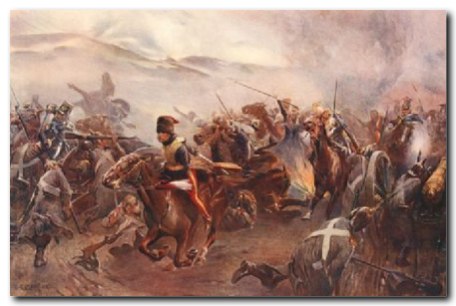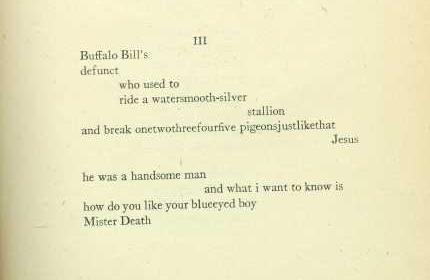Studying poetry in school felt like slow, merciless death. Those few weeks spent perusing the most insipid pap imaginable every year, tearing down the lines into rhyme, meter and all of the other technical detail, destroyed its power. I came away with the understanding that people in the ancient world were stuffy, insufferable boors. Why the fuck did people make such a fuss about this stuff? What was so great about it?
We were given tap water in safe spoonfuls, when there was a whole briny ocean out there to drink. We were restricted to a European reservation, with no idea that a whole world existed beyond our placid borders. Poetry had no meaning. It whispered in those dull rooms, while outside it shouted. And I never knew.
Caught the occasional glimpse, here and there. ee cummings and his brilliant Buffalo Bill. Ben Jonson’s superb The Noble Nature. Shakespeare’s dramatic and powerful Sonnet XXXV. Emily Dickenson’s deceptively simple I Took My Power in My Hand. But there were just a smattering. A taste of salt on my lips.
Then I discovered the wine dark sea, and set sail through the ancient world. The Islamic Empire. Ancient Greece. The old empires of China and Japan. Here was power. Here was passion. Here were the simple things made profound, the celebrations and the lamentations, the immensity I’d been told existed but had never been shown. And the laughter!
Set sail with me. And I know what you’re saying – my friend Monique said the same thing, once, when we were discussing poetry. “You just don’t think of old poets as being funny.” Of course you don’t. We’re never shown the whimsy, the apostasy, the robust ribald humor that existed in the ancient world. We’re just shown marble ideals.
It’s not like that at all.
Start drinking:
Abu Nuwas, Father Locks, would scoff at the idea that poetry must be something rarified and starched with dignity. He made fun of those poets of his day who slavishly followed the old conventions. Poetry in his age was stuck in a rut of morose Bedouin themes, contemplating the ashes of abandoned campsites and wailing over the simple life lost, while the glory of civilization beckoned. Abu Nuwas was having none of it:
The wretch paused to question an abandoned campsite,
While I paused to inquire about the neighborhood tavern.
May God never dry the tears of those who cry over stones,
Nor ease the love-pangs of those who yearn for tent pegs.
They said, “You mentioned the neighborhood where the Asads hail from…”
Shame on you! Tell me, who are the Asad family, anyway?
And who are the Tamim and the Qays and all of their ilk?
In God’s eyes, the Bedouins are nothing!
Forget all of that! Get on with yourself, and drink a fine vintage instead:
Golden-hued, it mingles with water and froth
As it pours from the hand of a slim-waisted beauty,
Who resembles a willow branch, flaunting its graceful bearing.
When the barkeeper saw that I’d been smitten,
He greeted me, making sure that I am lavish in my giving,
Then he brought me a cup brimming with the choices of wines,
Letting none other grasp it, straight from his hand to mine.
Give and be generous with all that your hand possesses,
Don’t hoard a thing today fearing poverty tomorrow.
What a difference between those who buy wine and enjoy it
Versus those who weep over the traces of old campsites!
Oh, you who rebuke me! Your signal has reached me
Though my pardon encompasses it, do not repeat it.
Were it meant as advice, then I’d accept your reproach
But your chiding is based upon envy instead.
Where was that poem when I was suffering in school? Where was glorious Father Locks and his brilliant paens to wine? If I’d stayed on the reservation created by our schools, I’d never have known about the Islamic Empire’s golden age, much less their robust tradition of khamriyyat – wine poems. Gives you a rather different impression of what the ancients got up to, doesn’t it?
Wine flows through those seas of poetry. Here’s Du Fu, a Tang Dynasty poet, who seems on the surface to have little to do with Abu Nuwas and his irreverance:
View From a Height (tr. David Lunde)
Sharp wind, towering sky, apes howling mournfully;
untouched island, white sand, birds flying in circles.
Infinite forest, bleakly shedding leaf after leaf;
inexhaustible river, rolling on wave after wave.
Through a thousand miles of melancholy autumn, I travel;
carrying a hundred years of sickness, I climb to this terrace.
Hardship and bitter regret have frosted my temples–
and what torments me most? Giving up wine!
See how he ends! Profundity followed by whimsy – it’s what I’ve come to love most about Chinese and Japanese poetry. No wallowing in morbid thoughts for them, not for long – even the most morbid subject ends up being light as air. How much easier life is when you can meet its worst blows with a shrug and a smile!
Day after day we can’t help growing older.
Year after year spring can’t help seeming younger.
Come let’s enjoy our winecup today,
Not pity the flowers fallen!
Wang Wei’s “On Parting With Spring” captures the essence of how we can live joyfully in a changing world, doesn’t it? He and Abu Nuwas would have had plenty to say to each other over those winecups.
Kobayashi Issa would have something to say to someone who got too morose over winter:
the dead tree
blooming
with butterflies
Bam! There you are. The haiku we studied in school was never like this – it was Westernized, paying too much attention to syllable count to translate meaning. Just let it be! Let us see that dead tree blooming with a million butterflies. Set it free.
Forget the insipid love poetry that made us think falling in love would be about as exciting as a chaperoned stroll. This is how it really is:
He’s equal with the Gods, that man
Who sits across from you,
Face to face, close enough, to sip
Your voice’s sweetness,
And what excites my mind,
Your laughter, glittering. So,
When I see you, for a moment,
My voice goes,
My tongue freezes. Fire,
Delicate fire, in the flesh.
Blind, stunned, the sound
Of thunder, in my ears.
Shivering with sweat, cold
Tremors over the skin,
I turn the colour of dead grass,
And I’m an inch from dying.
That was Sappho. I don’t need to say anything more, do I?
Alcaeus returns us to our theme of wine. I can see him speaking this famous line to a young Abu Nuwas: “Wine, dear boy, and truth.” Only that fragment survives of what must have been an extraordinary poem. But we have this, almost whole:
Come tip a few with me,
Melanippus, and you’ll see
why you crossed over Acheron
once again searching for the sun.
Come drink. Don’t set your sights
too high. Even King Sisyphus-
among all men, the wisest-
thought he might outsmart Death,
only to cross Acheron twice:
the judgement of Fate.
And now he labors endlesly
in Hades.
Come drink, and celebrate
while we are young. Later,
we will…the north wind blows.
All of these poets could have sat in the same tavern, drinking, celebrating the moment. Life is short, and precious. They seized it with poetry. They gave us an ocean.
They saw the truth, and shared it.
Why are we here? What is our purpose?
To drink!
Drink the still water
of the song of the ages.
Light of the stream, and
calm of the fountain!
–Garcia Lorca, “Ballad of the Small Plaza”





